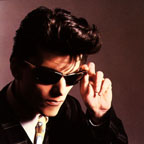
The Blow Monkeys biography
Edited by Goddess
Last updated on February 2, 1998
 The
Blow Monkeys were a unique British pop band whose recording careers
spanned the eight year period from 1982 - 1990. They released five albums
plus the Choices collection and twenty singles. They once had
a record banned by Radio 1 for political content and had managed
to hit the charts with songs highlighting the band's diversity. Their
recording legacy is substantial, diverse and by and large impressive,
especially in comparison to many of their contemporary rival bands.
The
Blow Monkeys were a unique British pop band whose recording careers
spanned the eight year period from 1982 - 1990. They released five albums
plus the Choices collection and twenty singles. They once had
a record banned by Radio 1 for political content and had managed
to hit the charts with songs highlighting the band's diversity. Their
recording legacy is substantial, diverse and by and large impressive,
especially in comparison to many of their contemporary rival bands.
The Blow Monkeys were always a difficult group to pigeon hole. Dr. Robert, the Blow Monkeys lead singer and songwriter, had an aim of avoiding being compartmentalized through continuous changes in style and direction. This in and of itself led to the band's inexplicable charm. One of Dr. Robert's greatest influences was the work of the late Marc Bolan from the popular and highly regarded early seventies pop band T Rex. The Blow Monkeys work embraced this influence along with much loved influences of pop and soul and later dance and house music.
 Dr.
Robert (Bruce Robert Howard) was born in Scotland (Haddington, East
Lothian) on May 2nd 1961. He spent most of his early years in Kings
Lynn in Norfolk. This early upbringing would be a great source of inspiration
for his more recent solo records. At the age of 16, he emigrated to
Australia, just before punk had fully taken a grip on the British music
scene.
Dr.
Robert (Bruce Robert Howard) was born in Scotland (Haddington, East
Lothian) on May 2nd 1961. He spent most of his early years in Kings
Lynn in Norfolk. This early upbringing would be a great source of inspiration
for his more recent solo records. At the age of 16, he emigrated to
Australia, just before punk had fully taken a grip on the British music
scene.
He only spent a few years in Australia knowing that music was the main element in his life and that London was the place to be. Therefore in the early 1980's Robert returned to London along with his wife, Linda Nolte. His sole purpose for going back to London was to start a band.
In London, Robert met Neville Henry (a saxophonist) who shared his aim of forming a "jazz-punk" band. Tony Kiley (drums) and Mick Anker (bass) were soon aboard and the Blow Monkeys were formed. There is much speculation for the naming of the band, one of those being that when Robert was living in Australia heard the expression used as a somewhat disparaging term for Aboriginal didgeridoo players. It has also been cited as jazz slang for saxophone players.
After a year's practice the group released a 7" single on a new label (Parasol records) in 1982. The record consisted of two tracks written by Robert Live Today Love Tomorrow backed with In Cold Blood and came in a plain sleeve.
It is currently Wednesday, May 01, 2024 11:27 PM
